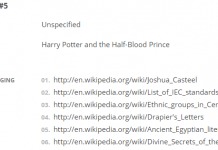 Remember the Elsevier boycott by academics I mentioned on Febuary 1? Techdirt has a follow-up piece indicating that as the boycott has grown, Elsevier has backed down from its support of the Research Works Act that would have prevented the government from requiring government-funded research be offered for open and free access after a period of time.
Remember the Elsevier boycott by academics I mentioned on Febuary 1? Techdirt has a follow-up piece indicating that as the boycott has grown, Elsevier has backed down from its support of the Research Works Act that would have prevented the government from requiring government-funded research be offered for open and free access after a period of time.
Even though the publisher has backed down, it continues to complain about “inflexible [government] mandates” that could “undermine the peer-reviewed journals that serve an essential purpose in the research community.”
Mike Masnick writes:
That’s pretty ridiculous actually. None of these mandates "undermine" these journals in any way — unless you consider their insane set up (free writing, free editing, full copyright ownership, and subscriptions that cost tens of thousands of dollars) some sort of divine right. The mandates refer to federally funded research, which should be accessible by the public since they paid for the research in the first place. Elsevier doesn’t pay for the research. Hell, they don’t even pay the researcher for their paper. Or the peer reviewers for their work. So forgive me for not shedding any tears if Elsevier has to learn to adapt to only being able to have the exclusive rights to a paper for a year.
Masnick also notes that Representative Darrel Issa, one of the bill’s original sponsors, has said he will not move forward on the bill, and claims to understand the importance of “open access” and that it’s the “wave of the future.” Didn’t this guy also propose SOPA and PIPA? I’m a little skeptical that this particular leopard can change his spots.

































Let’s give credit where credit is due. Yes Issa supported this bill, but he also was one of the biggest opponents of SOPA. He did not, as you suggest, SOPA.
As for Elsevier, a big aspect is missed in your article. Not only do they not pay the researcher, the researcher pays them: from his grant money; other researchers pay to read the articles: from their grant money; and university libraries pay to stock the articles; usually from the money they take from grants for overhead.
In other words, Elsevier is one of the biggest if not the biggest corporate welfare queens as a percentage of their income.